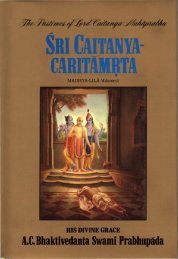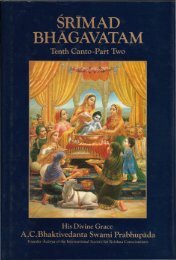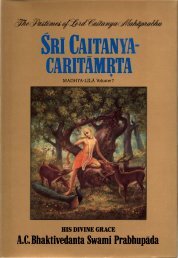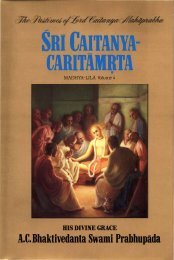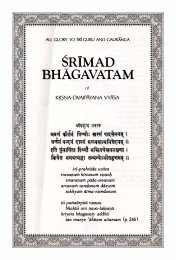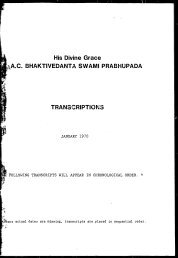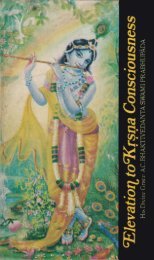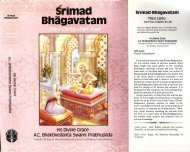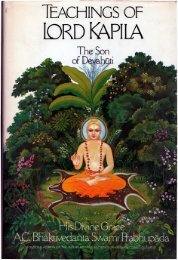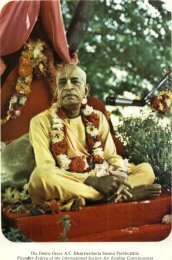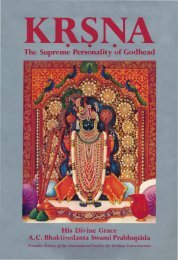The Perfection of Yoga - Original 1972 Book scan - Prabhupada
The Perfection of Yoga - Original 1972 Book scan - Prabhupada
The Perfection of Yoga - Original 1972 Book scan - Prabhupada
- No tags were found...
You also want an ePaper? Increase the reach of your titles
YUMPU automatically turns print PDFs into web optimized ePapers that Google loves.
<strong>The</strong> <strong>Perfection</strong> <strong>of</strong> <strong>Yoga</strong>His Divine GrdceA.C. Bhdktiveddntd Swdmi Prdbhupddd'l Founder-Acarya <strong>of</strong> the International Society for Krishna Consciousness,.ISKCON Press, New York
ContentsI. <strong>Yoga</strong> as Reestablishing Relationswith Kr:va 5II. <strong>Yoga</strong> as Work in Devotion 12Ill. <strong>Yoga</strong> as Meditation on KrJ).a 16IV. <strong>Yoga</strong> as Rejected by Arjuna 22V. <strong>Yoga</strong> as Body and Mind Control 28VI. <strong>Yoga</strong> as Freedom from Duality andDesignation 45VII. <strong>The</strong> Fate <strong>of</strong> the Unsuccessful Yogi 49VIII. <strong>The</strong> <strong>Perfection</strong> <strong>of</strong> <strong>Yoga</strong> 59ANNIE'S BOOK STOP"f){,_£ §uat .:;:/fmz.7.ican fJ3uok Euhan'jl!"Since 1974"'Yon·, . ., N>!V>r V/,.:;ited A <strong>Book</strong> Store Likt' lt."55 W. Main St. • Bay Shore, NY 11706
@ <strong>1972</strong> by ISKCON PRESS. All rights reservedLibrary <strong>of</strong> Congress Catalogue Card N{). 72-76302ISBN 0-912776-36-6, ..j!lIiReaders interested in the subject matter <strong>of</strong> thisbook are invited by the International Society forKrishna Consciousness to correspond with its Secretary.Internatiunal Society for Krishna Consciousness3826 Willat AvenueCulver City, California 90230.First Printing: 30,000 copiesSecond Printing: 100,000 copiesrJ!e,d i the Upitd. tqts :?t. Am'8ricaj'
OTHER BOOKSby A.C. Bhaktivedanta Swami <strong>Prabhupada</strong>B hagavad-gTta As It IsSrTmad-Bhagavatam, Cantos 1-3 (6 Vols.)Teachings <strong>of</strong> Lord Caitanya<strong>The</strong> Nectar <strong>of</strong> DevotionEasy Journey to Other PlanetsKrIJa Consciousness: <strong>The</strong> Topmost <strong>Yoga</strong> SystemKrIJa, <strong>The</strong> Supreme Personality <strong>of</strong> Godhead (2 Vols.)Transcendent! Teachings <strong>of</strong> Prahlad MaharajTranscendental Teachings <strong>of</strong> Caitanya MahaprabhuBeyond Birth and DeathOn the Way to KrIJaRaja-vidya: <strong>The</strong> King <strong>of</strong> KnowledgeElevation to KrIJa ConsciousnessBack to Godhead Magazine (Founder)SrilsopanidComplt!tf! catalogue is available upon request fromISKCON BOOKS MAIL-ORDER3826 Will at A venueCulver City, Calif. 90230
1<strong>Yoga</strong> AsReestablishingRelations With Krsna. . .We have heard many times <strong>of</strong> the yoga system.<strong>The</strong> yoga system is approved by Bhagavad-gitii, butthe yoga system in Bhagavad-gitii is especially meantfor purification. <strong>The</strong> aim is threefold: to control thesenses, to purify activities and to link oneself toKrQ.a in a reciprocal relationship.<strong>The</strong> Absolute Truth is realized in three stages:impersonal Brahman, localized Paramatma (Super·soul) and ultimately asBhagavan, the SupremePersonality <strong>of</strong> Godhead. In the final analysis, theSupreme Absolute Truth is a Person, and simul·taneously He is the all-pervading Supersoul withinthe hearts <strong>of</strong> all living entities and within the core<strong>of</strong> all atoms, and He is the brahmajyoti or theeffulgence <strong>of</strong> spiritual light as well. Bhagavan SriKrQ.a is full <strong>of</strong> all opulence as the Supreme Personality<strong>of</strong> Godhead, but at the same time He is full<strong>of</strong> all renunciation. In the material world we findthat one who has much opulence is not very muchinclined to give it up, but KrQ.a is not like this. Hecan renounce everything and remain complete inHimself.When we read or study Bhagavad-gitii under abona fide spiritual master we should not think thatthe spiritual master is presenting his own opinions.5
6 <strong>The</strong> <strong>Perfection</strong> <strong>of</strong> <strong>Yoga</strong>It is not he who is speaking. He is just an instrument.<strong>The</strong> real speaker is the Supreme Personality <strong>of</strong> Godheadwho is both within and without. At thebeginning <strong>of</strong> His discourse on the yoga system in the.Sixth Chapter <strong>of</strong> Bhagavad-gitii, Sri KrQa says:aniisrita karma-phalamkaryam karma karoti yasa sannyiisi ca yogi cana niragnir na ciikriya"One who is unattached to the fruits <strong>of</strong> his workand who works as he is obligated is in the renouncedorder <strong>of</strong> life, and he is the true mystic; not he wholights no fire and performs no work." (Bg. 6.1)Everyone is working and expecting some result. Onemay ask what is the purpose <strong>of</strong> working if no resultis expected? A remuneration or salary is alwaysdemanded by the worker. But here KrQa indicatesthat one can work out <strong>of</strong> a sense <strong>of</strong> duty alone, notexpecting the results <strong>of</strong> his activities. If one works inthis way, then he is actually a sannyiisi; he is in therenounced order <strong>of</strong> life.According to Vedic culture, there are four stages<strong>of</strong> life: brahmaciiri, grhastha, viinaprastha and sannyiisa.Brahmaciiri is student life devoted to trainingin spiritual understanding. Grhastha life is marriedhouseholder life. <strong>The</strong>n upon reaching the approximateage <strong>of</strong> fifty, one may take the viinaprasthaorder-that is, he leaves his home and children andtravels with his wife to holy places <strong>of</strong> pilgrimage.Finally he gives up both wife and children and remainsalone to cultivate KrQa consciousness, and
<strong>Yoga</strong> as Reestablishing Relations with K.rJ.la 7that stage is called sannyiisa, or the renounced order<strong>of</strong> life. Yet Krqa indicates that for a sannyiisi,renunciation is not all. In addition, there must besome duty. What then is the duty for a sannyiisi, forone who has renounced family life and no longerhas material obligations? His duty is a most responsibleone; it is to work for Krqa. Moreover, this isthe real duty for everyone in all stages <strong>of</strong> life.In everyone's life there are two duties: one is toserve the illusion, and the other is to serve the reality.When one serves the reality, he is a real sannyiisi.And when one serves the illusion, he is deluded bymiiyii. One has to understand, however, that he isin all circumstances forced to serve. Either he servesthe illusion or the reality. <strong>The</strong> constitutional pooition<strong>of</strong> the living entity is to be a servant, not a master.Everyone in the material world is a servant; -no oneis master. One may think that he is the master, buthe is actually a servant. When one has a family hemay think that he is the master <strong>of</strong> his wife, or hischildren, or his home, business and so on, but thatis all false. One is actually the servant <strong>of</strong> his wife, <strong>of</strong>his children and <strong>of</strong> his business. <strong>The</strong> president maybe considered to be the master <strong>of</strong> the country, butactually he is the servant <strong>of</strong> the country. Our positionis always as servant-either as servant <strong>of</strong> the illusionor as servant <strong>of</strong> God. If, however, we remain theservant <strong>of</strong> the illusion, then our life is wasted. Ofcourse everyone is thinking that he is not a servant,that he is working only for himself. Although thefruits <strong>of</strong> his labor are transient and illusory, theyforce him to become a servant <strong>of</strong> illusion or a
8 <strong>The</strong> <strong>Perfection</strong> <strong>of</strong> <strong>Yoga</strong>servant <strong>of</strong> his own senses. But when one awakens tohis transcendental senses and actually becomes situatedin knowledge, he then becomes a servant <strong>of</strong> thereality. When one comes to the platform <strong>of</strong> knowledge,he understands that in all circumstances he isa servant. Since it is not possible for him to bemaster, he is much better situated serving the realityinstead <strong>of</strong> the illusion. When one becomes aware <strong>of</strong>this, he attains the platform <strong>of</strong> real knowledge. Bysannyiisa, the renounced order <strong>of</strong> life, we refer toone who has come to this platform. Sannyiisa is aquestion <strong>of</strong> realization, not social status.It is the duty <strong>of</strong> everyone to become Krl}aconscious and to serve the cause <strong>of</strong> KrQa. When oneactually realizes this he becomes a mahiitmii, or agreat soul. In Bhagavad-gitii Krl}a says that aftermany births, when one comes to the platform <strong>of</strong> realknowledge, he "surrenders unto Me." Why is this ?Viisudevafl sarvam iti. <strong>The</strong> wise man realizes that"Vasudeva [KrlJa) is everything." However, Krl}asays that such a great soul is rarely found. Why isthis? If an intelligent person comes to understandthat the ultimate goal <strong>of</strong> life is to surrender untoKrl}a, why should he hesitate? Why not surrenderimmediately? What is the point in waiting for somany births? When one comes to that point <strong>of</strong>surrender, he becomes a real sannyiisi. Krq.a neverforces anyone to surrender unto Him. Surrender isa result <strong>of</strong> love, transcendental love. Where there isforce and where there is no freedom, there can beno love. When a mother loves a child, she is notforced to do so, nor does she do so out <strong>of</strong> expectation<strong>of</strong> some salary or remuneration.
<strong>Yoga</strong> as Reestablishing Relations with KrQ.a9Similarly, we can love the Supreme Lord in somany ways-we can love Him as master, as friend, aschild or as husband. <strong>The</strong>re are five basic rasas orrelationphips in which we are eternally related toGod. When e are actually in the liberated stage <strong>of</strong>knowledge, we can understand that our relationshipwith the Lord is in a particular rasa. That platformis called svarupa-siddhi, or real self-realization. Everyonehas an eternal relationship with the Lord, eitheras master and servant, friend and friend, parent andchild, husband and wife, or lover and beloved. <strong>The</strong>serelationships are eternally present. <strong>The</strong> whole process<strong>of</strong> spiritual realization and the actual perfection<strong>of</strong> yoga is to revive our consciousness <strong>of</strong> this relationship.At present our relationship with the SupremeLord is pervertedly reflected in this material world.In the material world, the relationship betweenmaster and servant is based on money or force orexploitation. <strong>The</strong>re is no question <strong>of</strong> service out <strong>of</strong>love. <strong>The</strong> relationship between master and servant,pervertedly reflected, continues only for so long asthe master can pay the servant. As soon as the paymentstops, the relationship also stops. Similarly, inthe material world there may be a relationshipbetween friends, but as soon as there is a slightdisagreement, the friendship breaks, and the friendbecomes an enemy. When there is a difference <strong>of</strong>opinion between son and parents, the son leaveshome and the relationship is severed. <strong>The</strong> same withhusband and wife; a slight difference <strong>of</strong> opinion,and there is divorce.·No relationship in this material world is actual oreternal. We must always remember that these
10 <strong>The</strong> <strong>Perfection</strong> <strong>of</strong> <strong>Yoga</strong>ephemeral relationships are simply perverted reflections<strong>of</strong> that eternal relationship that we have withthe Supreme Personality <strong>of</strong> Godhead. We haveexperience that the reflection <strong>of</strong> an object in a glassis not real. It may appear real, but when we go totouch it we find that there is only glass. We mustcome to understand thatthese relationships asfriend, parent, child, master, servant, husband, wifeor lover are simply reflections <strong>of</strong> that relationshipthat we have with God. When we come to this platform<strong>of</strong> understanding, then we are perfect in knowledge.When that knowledge comes, we begin tounderstand that we are servants <strong>of</strong> KrIJ.a and thatwe have an eternal love relationship with Him.In this love relationship there is no question <strong>of</strong>remuneration, but <strong>of</strong> course remuneration is there,and it is much greater than whatever we earn herethrough the rendering <strong>of</strong> service. <strong>The</strong>re is no limit toSri Krl}a's remuneration. In this connection there isthe story <strong>of</strong> Bali Maharaja, a very powerful king whoconquered a number <strong>of</strong> planets. <strong>The</strong> denizens <strong>of</strong> theheavenly planets appealed to the Supreme Lord tosave them, for they had been conquered by thedemonic king, Bali Maharaja. Upon hearing theirpleas, Sri Krl}a took the shape <strong>of</strong> a dwarf briihma[laboy and approached Bali Maharaja, saying, "My dearking, I would like something from you. You are agreat monarch and are renowned for giving in charityto the briihma[!as, so would you give me something?"Bali Maharaja said, "I will give you what youwant."
<strong>Yoga</strong> as Reestablishing Relations with Qall"I simply want whatever land I can cover in threesteps,'? the boy said."Oh, is that all?" the king replied. "And whatwill you do with such a small piece <strong>of</strong> land?""Though it may be small, it will suffice me," theboy smiled.Bali Maharaja agreed, and the boy dwarf tooktwo steps and covered the entire universe. He thenasked Bali Maharaja where he was going to take histhird step, and Bali Maharaja, understanding thatthe Supreme Lord was showing him His favor, replied:"My dear Lord, I have now lost everything.I have no other property, but I do have my head.Would You so kindly step there?"Lord Sri KrIJ.a was then very much pleased withBali Maharaja, and He asked, "What would youlike from Me?""I never expected anything from You," BaliMaharaja said. "But I understand that You wantedsomething from me, and now I have <strong>of</strong>fered Youeverything.""Yes," the Lord said, "but from My side I havesomething for you. I shall remain always as an ordercarrierservant in your court." In this way the Lordbecame Bali Maharaja's doorman, and that was hisreturn. If we <strong>of</strong>fer something to the Lord, it is returnedmillions <strong>of</strong> times. But we should not expectthis. <strong>The</strong> Lord is always eager to return the service<strong>of</strong> His servant. Whoever thinks that the service <strong>of</strong>the Lord is actually his duty is perfect in knowledgeand has attained the perfection <strong>of</strong> yoga.·
2<strong>Yoga</strong> AsWork In DevotionWe have heard the names <strong>of</strong> so many differentyogas and yogis, but in Bhagavad-gitii KrQa saysthat he is the actual yogi who has surrendered himself"fully unto Me." KrQa proclaims that there isno difference between renunciation (sannyiisa) andyoga.yam sannyiisam iti priihuryogam tam viddhi par,ujavana hy asannyasta-sankalpoyogi bhavati ka<strong>scan</strong>a"What is called renunciation is the same as yoga, orlinking oneself with the Supreme; for no one canbecome a yogi unless he renounces the desire forsense gratification." (Bg. 6.2)In Bhagavad-gitii there are three basic types <strong>of</strong>yoga delineated -karma-yoga, jiiiina-yoga and bhaktiyoga.<strong>The</strong> systems <strong>of</strong> yoga may be likened unto astaircase. Someone may be on the first step, some·one may be halfway up, or someone may be on thetop step. When one is elevated to certain levels, heis known as a karma-yogi, jiiiina-yogi, etc. In allcases, the service to the Supreme Lord is the same.It is a difference in elevation only. Thus Sri" KQatells Arjuna that he must understand that renuncia·tion (sannyiisa) and yoga are the same because withoutbeing freed from desire and sense gratificationone can become neither a yogi nor a sannyiisi.12
<strong>Yoga</strong> as Work in Devotion 13<strong>The</strong>re are soine yogis who perform yoga for apr<strong>of</strong>it, but that is not real yoga. Everything must beengaged in the service <strong>of</strong> the Lord. Whatever we doas an ordinary worker, or as a sannyiisi, or as a yogi,or as a philosopher must be done in KrQa conscious·ness. When we are absorbed in the thought <strong>of</strong> servingKrlJa and when we act in that consciousness, we canbecome J:eal sannyiisis and real yogis.For those who are taking the first step up thestaircase <strong>of</strong> the yoga system, there is work. Oneshould not think that simply because he is beginningyoga that he should stop working. In Bhagavad-gitiiKrlJa asks Arjuna to become a yogi, but He nevertells him to cease from fighting. Quite the contrary.Of course one may ask how a person may be ,a yogiand at the same time a warrior. Our conception <strong>of</strong>yoga practice is that <strong>of</strong> sitting very straight with legscrossed and eyes half-closed staring at the tip <strong>of</strong> ournose and concentrating in this way in a lonely place.So how is it that KrQa is asking Arjuna to become ayogi and at the same time participate in a ghastlycivil war? That is the mystery <strong>of</strong> Bhagavad-gitii: onecan remain a fighting man and at the same time bethe highest yogi, the highest sannyiisi. How is thispossible? In KrQa consciousness. One simply has t<strong>of</strong>ight for KrQa, work for KrQa, eat for KrQa, sleepfor KrQa and dedicate all activities to Krya. In thisway one becomes the highest yogi and the highestsannyiisi. That is the secret.In the Sixth Chapter <strong>of</strong> Bhagavad-gitii, Sri Krryainstructs Arjuna how to perform meditational yoga,but Arjuna rejects this as too difficult. How then is
14 <strong>The</strong> <strong>Perfection</strong> <strong>of</strong> <strong>Yoga</strong>Arjuna considered to be a great yogi? AlthoughKrr.Ja saw that Arjuna was rejecting the meditationalsystem, He proclaimed Arjuna to be the highest yogibecause "You are always thinking <strong>of</strong> Me." Thinking<strong>of</strong> KrQa is the essence <strong>of</strong> all yoga systems-<strong>of</strong> thehatha, karma, jiiiina, bhakti or any other system <strong>of</strong>yoga, sacrifice or charity. All the recommendedactivities for spiritual realization end in KrQa consciousness,in thinking always <strong>of</strong> KrQa. <strong>The</strong> actualperfection <strong>of</strong> human life lies in being always KrQaconscious and always being aware <strong>of</strong> KrQa whileperforming all types <strong>of</strong> activities.In the preliminary stage one is advised to alwayswork for KI;sna. One must be always searching outsome duty or some engagement, for it is a bad policyto remain idle even for a second. When one actuallybecomes advanced through such engagements, thenhe may not work physically, but he is always engagedwithin by constantly thinking <strong>of</strong> KrQa. In the preliminarystage, however, one is always advised toengage one's senses in the service <strong>of</strong> K&J1a. <strong>The</strong>reare a variety <strong>of</strong> activities one can perform in servingKrQa. <strong>The</strong> International Society for Krishna Consciousnessis intended to help direct aspirant devoteesin these activities. For those working in Ks.11a consciousness,there are simply not enough hours in theday to serve KrQa. <strong>The</strong>re are always activities,engagements both day and night, which the student<strong>of</strong> KrQa consciousness performs joyfully. That isthe stage <strong>of</strong> real happiness-constant engagementfor I\r&J1a and spreading K&'1a consciousness aroundthe world. In the material world one may become
<strong>Yoga</strong> as Work in Devotion 15very tired if he works all the time, but if one worksin Kri?IJa consciousness, he can chant Hare Kpmaand engage in devotional service twenty-four hoursa day and never get tired. But if we vibrate somemundane vibration, then we soon become exhausted.<strong>The</strong>re is no question <strong>of</strong> becoming tired on the spiritualplatform. <strong>The</strong> spiritual platform is absolute. Inthe material world everyone is working for sensebrratification. <strong>The</strong> pr<strong>of</strong>its <strong>of</strong> one's labor in thematerial world are used to gratify one's senses. Buta real yogi: does not desire such fruits. He has no desireother than KJ;qa, and KJ;I).a is already there.
3<strong>Yoga</strong> AsMeditation On Krsna. . .In India there are sacred places where yogis go tomeditate in solitude, as prescribed in Bhagavad-gitii.Traditionally, yoga cannot be executed in a publicplace, but ins<strong>of</strong>ar as kirtana-mantra-yoga, or theyoga <strong>of</strong> chanting the Hare Krl}a mantra: Hare Krrma,Hare Ka, Ka .Krl)a, Hare Hare/Hare Rama,Hare Rama, Riima Riima, Hare Hare-is concerned,the more people present, the better. When LordCaitanyaMahiiprabhu was performing kirtana inIndia some five hundred years ago, He organized ineach group sixteen persons to lead the chanting,and thousands <strong>of</strong> persons chanted with them. Thisparticipation in kirtana, in the public chanting <strong>of</strong>the names and glories <strong>of</strong> God, is very possible and isactually easy in this age; but as far as the meditationalprocess <strong>of</strong> yoga is concerned, that is very difficult.It is specifically stated in Bhagavad-gitii that toperform meditational yoga one should go to a secludedand holy place. In other words, it is necessaryto leave home. In this age <strong>of</strong> overpopulation it is notalways possible to find a secluded place, but this isnot necessary in bhak ti-yoga.In the bhakti-yoga system there are nine differentprocesses: hearing, chanting, remembering, serving,worshiping the Deity in the temple, praying, carrying·out orders, serving Krl}a as friend and sacrificing forHim. Out <strong>of</strong> these, srava[Lam k1rtanam, hearing and16
<strong>Yoga</strong> as Meditation on KJ;eQ.a l 7chanting, are considered the most important. At apublic kirtana one person can chant Hare Kr1?1}a,1-lar·e Kr1?lJa, Kr1?lJa Kr1?lJa, Hare Hare/ Hare Rama,llare Rama, Rama Rama, Hare Hare, while a grouplistens, and at the end <strong>of</strong> the mantra, the group canrespond, and in this way there is a reciprocation <strong>of</strong>hearing and chanting. This can easily be performedin one's own home, with a small group <strong>of</strong> friends orwith many people in a large public place. One mayaltempt to practice meditational yoga in a large cityor in a society, but one must understand that thisis one's own concoction and is not the methodrecommended in Bhagavad-gita.<strong>The</strong> whole process <strong>of</strong> the yoga system is to purifyoneself. And what is this purification? Purificationensues upon the realization <strong>of</strong> one's actual identity.Purification is realizing that "I am pure spirit-Jamnot this matter." Due to material contact, we areidentifying ourselves with matter, and we are thinking,"I am this body." But in order to perform real_yoga one must realize his constitutional position asl1eing distinct from matter. <strong>The</strong> purpose <strong>of</strong> seekingout a secluded place and executing the meditationalprocess is to come to this understanding. It is notpossible to come to this understanding if one exewtesthe process improperly. In any case, this is theconsideration <strong>of</strong> Lord Caitanya Mahaprabhu:harer nama harer namaharer namaiva kevalamkalau nasty eva nasty evanasty eva gatir anyathii
18 <strong>The</strong> <strong>Perfection</strong> <strong>of</strong> <strong>Yoga</strong>"In this age <strong>of</strong> quarrel and disagreement [Kali-yuga],there is no other way <strong>of</strong> spiritual realization but thischanting <strong>of</strong> the names. <strong>The</strong>re is no other way, thereis no other way, there is no other way."It is generally thought, at least in the Westernworld, that the yoga system involves meditating onthe void. But the Vedic literatures do not recommendmeditating on any void. Rather, the Vedasmaintain that yoga means meditation on Vil)u, andthis is also maintained in Bhagavad-gitii. In manyyoga societies we find that people sit cross-leggedand very straight, then close their eyes to meditate,and so fifty percent <strong>of</strong> them go to sleep becausewhen we close our eyes and have no subject matterfor contemplation, we simply go to sleep. Of coursethis is not recommended by Sri K.rqa in Bhagavadgitii.One must sit very straight, and the eyes be onlyhalf-closed, gazing at the tip <strong>of</strong> one's nose. If onedoes not follow the instructions, the result will besleep and nothing more. Sometimes, <strong>of</strong> course, meditationgoes on when one is sleeping, but this is notthe recommended process for the execution <strong>of</strong> yoga.Thus to keep oneself awake Krl)a advises that onealways keep the tip <strong>of</strong> the nose visible. In addition,one must be always undisturbed. If the mind isagitated, or if there is a great deal <strong>of</strong> activity goingon, one will not be able to concentrate. In meditationalyoga one must also be devoid <strong>of</strong> fear. <strong>The</strong>reis no question <strong>of</strong> fear when one enters spiritual life.And one must also be brahmaciiri, completely freefrom sex life. Nor can there be any demands on onemeditating in this way. When there are no demands,
<strong>Yoga</strong> as Meditation on Kl;Qa 19and one executes this system properly, then he carfcontrol his mind. After one has met all the requirementsfor meditation, he must transfer his wholethought to Krr,ta or Vi1_1u. It is not that one is tolransfer his thought to vacancy. Thus Kr$r.ta sayslhat one absorbed in the meditational yoga systemis "always thinking <strong>of</strong> Me."<strong>The</strong> yogi obviously has to go through a great deal<strong>of</strong> difficulty to purify the iitmii (mind, body andsoul), but it is a fact that this can be done mosteffectively in this age simply by the chanting <strong>of</strong>Hare K_rg1a, Hare K.rwa, Kn>\la K.rpa, Hare Hare/Hare Rama, Hare Rama, Rama Rama, Hare Hare.Why is this? Because this transcendental sound vibrationis nondifferent from Him. When we chantllis name with devotion, then Krr,ta is with us, andwhen Krr,ta is with us, then what is the possibility<strong>of</strong> remaining impure? Consequently, one absorbedin Kl;sna consciousness, in chanting the names <strong>of</strong>Krr,ta and serving Him always, receives the benefit<strong>of</strong> the highest form <strong>of</strong> yoga. <strong>The</strong> advantage is thathe doesn't have to take all the trouble <strong>of</strong> the medil.ationalprocess. That is the beauty <strong>of</strong> Krr,ta consctousness.In yoga it is necessary to control all <strong>of</strong> the senses,and when all the senses are controlled, the mindmust be engaged in thinking <strong>of</strong> V il).U. One becomespeaceful after thus conquering material life.jitiitmana[l prasiintasyaparamiitmii samiihita[lSltOfifla·SUkha-du{lkheutathii miiniipamiinayo{lallthroughdeal
20 <strong>The</strong> <strong>Perfection</strong> <strong>of</strong> <strong>Yoga</strong>'I1:1'i·:'"I!' II,,,,'ll p'lil·! ''I· 1 ,j'l"For one who has conquered the mind, the Supersoulis already reached, for he has attained tranquility."(Bg. 6. 7) This material world has been likened to agreat forest fire. As in the forest, fire may automaticallytake place, so in this material world, althoughwe may try to live peacefully, there is always a greatconflagration. It is not possible to live in peace anywherein the material world. But for one who istranscendentally situated-either by the meditationalyoga system or by the empirical philosophicalmethod, or by bhakti-yoga-peace is possible. Allforms <strong>of</strong> yoga are meant for transcendentallife, but the method <strong>of</strong> chanting is especially effectivein this age. Kirtana may go on for hours, and onemay not feel tired, but it is difficult to sit in lotusposition perfectly still for more than a few minutes.Yet regardless <strong>of</strong> the process, once the fire <strong>of</strong> materiallife is extinguished, one does not simply experiencewhat is called the impersonal void. Rather, asKrqa tells Arjuna, one enters into the supreme abode.yunjann evam sadiitmiinamyogi niyata-miinasaftsiintim nirvii{w-paramiimmat-samsthiim adhigacchati"By meditating in this manner, always controlling thebody, mind and activities, the mystic transcendentalistattains to peace, the supreme nirviir-a whichabides in Me." (Bg. 6.15) Krqa's abode is not void.It is like an establishment, and in an establishmentthere is a variety <strong>of</strong> engagements. <strong>The</strong> successfulyogi actually attains to the Kingdom <strong>of</strong> God where
<strong>Yoga</strong> as Meditation on K{1,1a 21lltere is spiritual variegatedness. <strong>The</strong> yoga processesurc simply ways to elevate oneself to enter into thatubode. Actually we belong to that abode, but, beingforgetful, we are put in this material world. Just as amadman becomes crazy and is put into a lunatic asylum,so we, losing sight <strong>of</strong> our spiritual identity,becomeerazy and are put into this material world. Thus thematerial world is a sort <strong>of</strong> lunatic asylum, and we canc:asily notice that nothing is done very sanely here.Our real business is to get out and enter into theKingdom <strong>of</strong> God. In Bhagavad-g'ita Krg1a gives inforrnalion<strong>of</strong> this kingdom and also gives instructionsubout His position and our position-<strong>of</strong> what He isund what we are. All the information necessary isHCt forth in Bhagavad-g'ita, and a sane man will takeudvantage <strong>of</strong> this knowledge.
4<strong>Yoga</strong> AsRejected By Arjuna<strong>The</strong>re have been many yoga systems popularizedin the Western World, especially in this century, butnone <strong>of</strong> them have actually taught the perfection <strong>of</strong>yoga. In the Bhagavad-gitii, Sri KrQa, the SupremePersonality <strong>of</strong> Godhead, teaches Arjuna directly theperfection <strong>of</strong> yoga. If we actually want to participatein the perfection <strong>of</strong> the yoga system, in Bhagavadgitiiwe will find the authoritative statements <strong>of</strong> theSupreme Person.It is certainly remarkable that the perfection <strong>of</strong>"yoga was taught in the middle <strong>of</strong> a battlefield. It wastaught to Arjuna, the warrior, just before Arjunawas to engage in a fratricidal battle. Out <strong>of</strong> sentiment,Arjuna was thinking, "Why should I fightagainst my own kinsmen?" That reluctance to fightwas due to Aijuna's illusion, and just to eradicatethat illusion, Sri KrQa spoke the Bhagavad-gitii to ,,him. One can just imagine how little time must haveelapsed while Bhagavad-gitii was being spoken. Allthe warriors on both sides were poised to fight, sothere was very little time indeed-at the utmost, onehour. Within this one hour, the whole Bhagavad-gitiiwas discussed, and Sri KrQa set forth the perfection<strong>of</strong> all yoga systems to His friend Arjuna. At the end<strong>of</strong> this great discourse, Arjuna set aside his misgivingsand fought.However, within the discourse, when Arjuna heard22
<strong>Yoga</strong> as Rejected by Arjuna 23I he explanation <strong>of</strong> the meditational system <strong>of</strong> yogahowto sit down, how to keep the body straight, howLo keep the eyes half-closed and how to gaze at theLip <strong>of</strong> the nose without diverting one's attention, allthis being conducted in a secluded place alone-hereplied:yo 'yam yogas tvayii prokta[tsiimyena madhusiidanaetasyiiharh na pasyiimicaiicalatviit sthitirh sthiriim"0 Madhusudana, the system <strong>of</strong> yoga which Youhave summarized appears impractical and unendurableto me, for the mind is restless and unsteady_"(Bg. 6.33) This is important. We must always rememberthat we are in a material circumstancewherein at every moment our mind is subject toagitation. Actually we are not in a very comfortablesituation. We are always thinking that by changingour situation we will overcome our mental agitation,and we are always thinking that when we reach acertain point, all mental agitations will disappear.But it is the nature <strong>of</strong> the material world that wecannot be free from anxiety. Our dilemma is thatwe are always trying to make a solution to ourproblems, but this universe is so designed that thesesolutions never come.Not being a cheater, being very frank and open,Arjuna tells KrQa that the system <strong>of</strong> yoga which Hehas described is not possible for him to execute. Inspeaking to KrQa, it is significant that Arjunaaddresses Him as Madhusudana, indicating that
24 <strong>The</strong> <strong>Perfection</strong> <strong>of</strong> <strong>Yoga</strong>the Lord is the killer <strong>of</strong> the demon Madhu. It isnotable that God's names are innumerable, for He is<strong>of</strong>ten named according to His activities. Indeed, Godhas innumerable names because He has innumerableactivities. We are only parts <strong>of</strong> God, and we cannoteven remember how many activities we engage infrom our childhood to the present. <strong>The</strong> eternal Godis unlimited, and since His activities are also unlimited,He has unlimited names. <strong>of</strong> which KrQa is thechief. <strong>The</strong>n why is Arjuna addressing Him asMadhusiidana when, being KrQa's friend, he couldaddress Him directly as KrQa? <strong>The</strong> answer is thatAuna considers his mind to be like a great demon,such as the demon Madhu. If it were possible forKrQa to kill the demon called the mind, then Aunawould be able to attain the perfection <strong>of</strong> yoga. "Mymind is much stronger than this demon Madhu,"Arjuna is saying. "Please, if You could kill him, thenit would be possible for me to execute this yogasystem." Even the mind <strong>of</strong> a great man like Arjunais always agitated. As Arjuna himself says:cancalarh hi mana krIJapramiithi balavad d[!lhamtasyiiharh nigraharh manyeviiyor iva sudukaram"For the mind is restless, turbulent, obstinate andvery strong, 0 Kqa, and to subdue it is, it seems tome, more difficult than controlling the wind."(Bg. 6.34)It is indeed a fact that the mind is always tellingus to go here, go there, do this, do that-it is always
<strong>Yoga</strong> as Rejected by Arjuna 25Idling us which way to turn. Thus the sum andflU bstance <strong>of</strong> the yoga system is to control the agilutedmind. In the meditational yoga system thernind is controlled by focusing on the Supersoullhatis the whole purpose <strong>of</strong> yoga. But Arjuna sayslhat controlling this mind is more difficult thanHlopping the wind from blowing. One can imagineu man stretching out his arms trying to stop a hurrieane.Are we to assume that Arjuna is simply notsufficiently qualified to control his mind? <strong>The</strong> actualfact is that we cannot begin to understand theimmense qualifications <strong>of</strong> Arjuna. After all, he was apersonal friend <strong>of</strong> the Supreme Personality <strong>of</strong> Godhead.This is a highly elevated position and is onelhat cannot be at all attained by one without greattlualifications. In addition to this, Arjuna was renownedas a great warrior and administrator. He wasAuch an intelligent man that he could understandHhagavad-gitii within one hour, whereas at thepresent moment great scholars cannot even understandit in the course <strong>of</strong> a lifetime. Yet Arjuna waslhinking that controlling the mind was simply notpossible for him. Are we then to assume that whatwas impossible for Arjuna in a more advanced age ispossible for us in this degenerate age? We should notfor one moment think that we are in Arjuna 'scategory. We are a thousand times inferior.Moreover, there is no record <strong>of</strong> Arjuna's havingexecuted the yoga system at any time. At the sametime Arjuna was praised by KpI].a as the only manworthy <strong>of</strong> understanding Bhagavad-gitii. What wasArjuna's great qualification? Sri K&qa says, "You
26 <strong>The</strong> <strong>Perfection</strong> <strong>of</strong> <strong>Yoga</strong>are My devotee. You are My very dear friend."Despite this qualification, Arjuna refused to executethe meditational yoga system described by SriKrl]11. What then are we to conclude? Are we todespair the mind's ever being controlled? No, it canbe controlled, and the process is this KrIJ.a consciousness.<strong>The</strong> mind must be fixed always in KrIJ.a·Ins<strong>of</strong>ar as the mind is absorbed in KrIJ.a it hasattained the perfection <strong>of</strong> yoga.Now when we turn to the Srimad-Bhagavatam, inthe Twelfth Canto we find Sukadeva Gosvami tellingMaharaja Parikit that in the Golden Age, theSatyayuga, people were living for l 00,000 years,and at that time, when advanced living entitieslived for such lengths <strong>of</strong> time, it was possible toexecute this meditational system <strong>of</strong> yoga. But whatwas achieved in the Satyayuga by this meditationalprocess, and in the following _yuga, the Tretayuga,by the <strong>of</strong>fering <strong>of</strong> great sacrifices, and in the nextyuga, the Dvaparayuga, by temple worship, would beachieved at the present time, in this Kaliyuga, bysimply chanting the names <strong>of</strong> God, hari-kirtana, Harel(rQa. So from authoritative sources we learn thatthis chanting <strong>of</strong> Hare KrQa, Hare KrQa, KrQa KrQa, 1;Hare Hare I Hare Rama, Hare Rama, Rama Rama,Hare Hare is the embodiment <strong>of</strong> the perfection <strong>of</strong>yoga for this age.Today we have great difficulties living. fifty orsixty years. A man may live at the utmost eighty ora hundred years. In addition, these brief years arealways fraught with anxiety, with difficulties due tocircumstances <strong>of</strong> war, pestilence, famine and somany other disturbances. We're also not very intelligent,and, at the same time, we're unfortunate.
<strong>Yoga</strong> as Rejected by Arjuna 27<strong>The</strong>se are the characteristics <strong>of</strong> man living in Kaliyuga,a degraded age. So properly speaking we cannever attain success in this meditational_yoga systemdescribed by KrJ;la. At the utmost we can only gratifyour personal whims by some pseudo-adaptation .<strong>of</strong> this system. Thus people are paying moneylo attend some classes in gymnastic exercises anddeep-breathing, and they're happy if they thinkI hey can lengthen their lifetimes by a few years ort:nj oy better sex life. But we must understand thatthis is not the actual yoga system. In this agethat meditational system cannot be properly executed.Instead, all <strong>of</strong> the perfections <strong>of</strong> that systemean be realized through bhak ti-yoga, the sublime!JI'Ocess <strong>of</strong> Krl}a consciousness, specifically mantrayoga,the glorification <strong>of</strong> Sri Krl}a through thechanting <strong>of</strong> Hare KrQa. That is recommended inVedic Scriptures and is introduced by great authori-1 ies like Caitanya Mahaprabhu. Indeed, the Bhagavad-r,'ilii proclaims that the mahiitmiis, the great souls,arealways chanting the glories <strong>of</strong> the Lord. If onewants to be a mahatma in terms <strong>of</strong> the Vedic literalure,in terms <strong>of</strong> Bhagavad-gitii and in terms <strong>of</strong> theh'reat authorities, then one has to adopt this process<strong>of</strong> Krl}a consciousness and <strong>of</strong> chanting Hare Krl).a.But if we're content at making a show <strong>of</strong> meditationby sitting very straight in lotus position and goingin to a trance like some sort <strong>of</strong> performer, then thatis adifferent thing. But we should understand thatsuch show-bottle performances have nothing to dowith the actual perfection <strong>of</strong> yoga. <strong>The</strong> materialdisease cannot be cured by artificial medicine. Wehave to take the real cure straight from Krl).a.
5<strong>Yoga</strong> AsBody And Mind ControlThroughout Bhagavad-gitii, K;s.11a was encouragingArjuna to fight, for he was a warrior, and fightingwas his duty. Although Krqa delineates the meditationalyoga system in the Sixth Chapter, He does notstress it nor encourage Arjuna to pursue it as hispath. Krqa admits that this meditational process isvery difficult:sr"""i bhagaviin uviicaasarhsayarh mahii-biihomano durnigraharh calamabhyiisena tu kaunteyavairiigyerw ca grhyate"<strong>The</strong> Blessed Lord said: 0 mighty-armed son <strong>of</strong>Kunti, it is undoubtedly very difficult to curb therestless mind, but it is possible by constant practiceand by detachment." (Bg. 6.35) Here Krqa emphasizespractice and renunciation as ways to controlthe mind. But what is that renunciation? Today it ishardly possible for us to renounce anything, for weare so habituated to such a variety <strong>of</strong> material sensepleasures. Despite leading a life <strong>of</strong> uncontrolled senseindulgence, we attend yoga classes and expect toattain success. <strong>The</strong>re are so many rules and regulationsinvolved in the proper execution <strong>of</strong> yoga, andmost <strong>of</strong> us can hardly give up a simple habit likesmoking. In His discourse on the meditational yoga28
<strong>Yoga</strong> as Body and Mind Control 29MYHiem, KrI}.a proclaims that yoga cannot be properlyperformed by one who eats too much or eats tooli llle. One who starves himself cannot properly performyoga. Nor can the person who eats more thannf)uired. <strong>The</strong> eating process should be moderate,just enough to keep body and soul together; it shouldnot be for the enjoyment <strong>of</strong> the tongue. Whenpalatable dishes come before us, we are accustomedlo take not just one <strong>of</strong> the preparations but two,lhree and four-and upwards. Our tongue is neverlia I is fie d. But it is not unusual in India to see a yogiluke only a small spoonful <strong>of</strong> rice a day and nothingrnore. Nor can one execute the meditational yogaMystem if one sleeps too much or does not sleepMufficiently. KrI}.a does not say that there is such11 thing as dreamless sleep. As soon as we go toMlecp, we will have a dream, although we may notrnmember it. In the Gitii KrI}.a cautions that onewho dreams too much while sleeping cannot properlyexecute yoga. One should not sleep more thanHi x hours daily. Nor can one infected by insomnia,who cannot sleep at night, successfully execute yoga,for the body must be kept fit. Thus KrI}.a outlinesHo many requirements for disciplining the body. Alllhese requirements, however, can essentially bebroken down into four basic rules: no illicit sexualconnection, no intoxication, no meat-eating and nogambling. <strong>The</strong>se are the four minimum reguationsfor the execution <strong>of</strong> any yoga system. And in thisuge who can refrain from these activities? We have tolest ourselves accordingly to ascertain our success inyoga execution.
30 <strong>The</strong> <strong>Perfection</strong> <strong>of</strong> <strong>Yoga</strong>yogi yunfita satatamiitmiinarh rahasi sthitaekiiki yata-cittiitmiiniraSir aparigraha"A transcendentalist should always try to concentratehis mind on the Supreme Self; he should livealone in a secluded place and should always carefullycontrol his mind. He should be free from desiresand feelings <strong>of</strong> possessiveness." (Bg. 6.1 0) Fromthis verse we can understand that it is the duty <strong>of</strong>the yogi to always remain alone. Meditational yogacannot be performed in an assembly, at leastnot according to Bhagavad-gitii. It is not possible toconcentrate the mind in the meditational systemupon the Supersoul except in a secluded place. InIndia, there are still many yogis who assemble at theKumba Mela. Generally they are in seclusion, but onrare occasions they come to attend special functions.In India there are still thousands <strong>of</strong> yogis and sages,and every twelve years or so they meet in particularholy places-Allahabad, etc.-just as in America theyhave businessmen's conventions. <strong>The</strong> yogi, in additionto living in a secluded place, should also be freefrom desires and should not think that he is performingyoga to achieve some material powers. Norshould he accept gifts or favors from people. If he isproperly executing this meditational yoga, he staysalone in the jungles, forests or mountains and avoidssociety altogether. At all times he must be convincedfor whom he has become a yogi. He does notconsider himself alone because at all times theParamatma-Supersoul-is with him. From this we
<strong>Yoga</strong> as Body and Mind Control 3 11:an see that in modern civilization it is indeed verydifficult to execute this meditational form <strong>of</strong> yogaproperly. Contemporary civilization in this age <strong>of</strong>Kuli has actually made it impossible for us to bealone, to be desireless and to be possessionless.<strong>The</strong> method <strong>of</strong> executing meditational yoga isfurLher explained in considerable detail by Krt?Qa toArjuna. Srf Krt?qa says:sucau dese pratifithapyasthiram iisanam iitmana{l.niity-ucchritarh niitinicarhcailiijina-kus o t taramtatraikiigrarh mana{!. krtviiyata-cittendriya-kriya[l.upavisyiisane yunjyiidyogam iitma-visuddhaye"To practice yoga, one should go to a secluded placeund should lay kusa grass on the ground and theneover it with adeerskin and a s<strong>of</strong>t doth. <strong>The</strong> seathould neither be too high nor too low and shouldbe situated in a sacred place. <strong>The</strong> yogi should thenHit on it very firmly and should practice yoga by;ontrolling the mind and the senses, purifying theheart and fixing the mind on one point." (Bg. 6.I J -12) Generally yogis sit on tigerskin or deerskinLecause reptiles will not crawl on such skins todisturb their meditations. It seems that in God'soreation there is a use for everything. Every grassand herb has its use and serves some function,although we may not know what it is. So in BhagavadgitiiKrqa has made some provision whereby the
32 <strong>The</strong> <strong>Perfection</strong> <strong>of</strong> <strong>Yoga</strong>yogi doesn't have to worry about snakes. Havingacquired a good sitting place in a secluded environment,the yogi hegins to purify the atma-body,mind and soul. <strong>The</strong> yogi should not think, "Now Iwill try to achieve some wonderful powers." Sometimesyogis do attain certain siddhis or powers, hutthese are not the purpose <strong>of</strong> yoga, and real yogis donot exhibit them. <strong>The</strong> real yogi thinks, "I am nowcontaminated by this material atmosphere, so nowI must purify myself."We can quickly see that controlling the mindand ancannotbody is not such an easy thing and that we cannot1control them as easily as we can go to the store andpurchase something. But Krl)a indicates that these' rules can be easily followed when we are in Krl)aconsciOusness.Of course everyone is motivated by sex life, hutsex life is not actually discouraged. We have thismaterial body, and as long as we have it, sex desirewill be there. Similarly, as long as we have the body,we must eat to maintain it, and we must sleep inorder to give it rest. We cannot expect to negatethese activities, hut the Vedic literatures do giveus guidelines for regulation in eating, sleeping, mating,etc. If we at all expect success in the yoga system,we cannot allow our unbridled senses to take usdown the paths <strong>of</strong> sense objects; therefore guidelinesare set up. Lord Sri KJ;l)a is advising that themind can be controlled through regulation. If we donot regulate our activities, our mind will be moreand more agitated. It is not that activities are to bestopped, hut regulated by the mind always engaged
<strong>Yoga</strong> as Body and Mind Control 33in Krqa consciousness. Being always engaged inHorne activity connected with Krqa is actual samiidhi.II. is not that when one is in samiidhi he doesn't eat,work, sleep or enjoy himself in any way. Rather,.amiidhi can be defined as executing regulated activiLies while absorbed in the thought <strong>of</strong> Krqa.asamyatiitmanii yogodu§priipa iti me mativasyiitmanii tu yatatiisakyo 'viiptum upayata[l"For one whose mind is unbridled," Krqa furthersays, "self-realization is difficult work." (Bg.6.36)Anyone knows that an unbridled horse is dangerousLo ride. He can go in any direction at any speed, andhjs rider is likely to come to some harm. Ins<strong>of</strong>ar asthe mind is unbridled, Kpqa agrees with Arjuna thatthe yoga system is very difficult work indeed. "But,"Krqa adds, "he whose mind is controlled and strivesby right means is assured <strong>of</strong> success. That is Myjudgement." (Bg. 6.36) What is meant by "strives byright means"? One has to try to follow the fourbasic regulative principles as mentioned and executehis activities absorbed in Krqa consciousness.If one wants to engage in yoga at home, then hehas to make certain that his other engagements aremoderate. He cannot spend long hours <strong>of</strong> the dayworking hard to simply earn a livelihood. One shouldwork very moderately, eat very moderately, gratifyhis senses very moderately and keep his life as freefrom anxiety as possible. In this way practice <strong>of</strong> yogamay be successful.
34 <strong>The</strong> <strong>Perfection</strong> <strong>of</strong> <strong>Yoga</strong>What is the sign by which we can tell that one hasattained perfection in yoga? K,rl).a indicates that oneis situated in yoga when his consciousness is completelyunder his control.yadii viniyatam cittamIitman y eviivatithateniprha sarva-kiimebhyoyukta ity ucyate tadii"When the yogi, by practice <strong>of</strong> yoga, disciplines hismental activities and becomes situated in Transcendence-devoid<strong>of</strong> all material desires-he is said tohave attained yoga." (Bg.6.18) One who has attainedyoga is not dependent on the dictations <strong>of</strong> his mind;rather, the mind comes under his control. Nor is themind put out or extinguished, for it is the business<strong>of</strong> the yogi to think <strong>of</strong> KrlJ.a or Vil).U always. <strong>The</strong>yogi cannot allow his mind to go out. This maysound very difficult, but it is possible in K.r.pa consciousness.When one is always engaged in K.r.paconsciousness, in the service <strong>of</strong> KrQa, then how is itpossible for the mind to wander away from KrQa?In the service <strong>of</strong> K,r.pa, the mind is automaticallycontrolled.Nor should the yogi have any desire for materialsense gratification. If one is in KrQa consciousness,he has no desire other than KrQa. It is not possibleto become desireless. <strong>The</strong> desire for sense gratificationmust be overcome by the process <strong>of</strong> purification,but desire for Krl).a should be cultivated. It issimply that we have to transfer the desire. <strong>The</strong>re 1sno question <strong>of</strong> killing desire, for desire is the constant
<strong>Yoga</strong> as Body and Mind Control 35companion <strong>of</strong> the living entity. KI;qa consciousnessis the process by which one purifies his desires;instead <strong>of</strong> desiring so many things for sense gratification,one simply desires things for the service <strong>of</strong>J
36 <strong>The</strong> <strong>Perfection</strong> <strong>of</strong> <strong>Yoga</strong>Bhagavad-gitii is concerned. A whole purification <strong>of</strong>consciousness is required.In the execution <strong>of</strong> yoga, it is very important thatthe mind is not agitated.yatha aipo nivatasthonengate sopama smrtayogino yata-cittasyayuii jato yo gam at mana"As a lamp in a windless place does not waver, sothe transcendentalist, whose mind is controlled, remainsalways steady in his meditation on the transcendentSelf." (Bg. 6.19) When a candle is in awindless place, its flame remains straight and does notwaver. <strong>The</strong> mind, like the flame, is susceptible to somany material desires that with the slightest agitationit will move. A little movement <strong>of</strong> the mindcan change the whole consciousness. <strong>The</strong>refore inIndia one seriously practicing yoga traditionallyremained brahmaciin, or celibate. <strong>The</strong>re are twokinds <strong>of</strong> brahmaciiri; one is completely celibate andand the other is grhastha-brahmaciiri, that is to sayhe has a wife, he does not associate with any otherwoman, and his relations with his own wife arestrictly regulated. In this way, either by completecelibacy or restricted sex life, one's mind is keptfrom being agitated. Yet when one takes a vow toremain a complete celibate, his mind may still beagitated by sexual desire; therefore in India thosepracticing the traditional yoga under strict vows <strong>of</strong>celibacy are not allowed to sit alone even with a
<strong>Yoga</strong> as Body and Mind Control 3 7mother, sister or daughter. <strong>The</strong> mind is so fickle thatthe slightest suggestion can create havoc.<strong>The</strong> yogi should have his mind trained in such away that as soon as his mind wanders from medi·tation on ViJ)U, he drags it back again. This requiresa great deal <strong>of</strong> practice. One must come toknow that his real happiness is in experiencing thepleasure <strong>of</strong> his transcendental senses, not the materialsenses. Senses are not to be sacrificed, and desiresare not to be sacrificed, but there are both desiresand sense satisfaction in the spiritual sphere. Realhappiness is transcendental to material, sensualexperience. If one is not convinced <strong>of</strong> this, he willsurely be agitated and will fall down. One shouldtherefore know that the happiness he is trying toderive from material senses is not really happiness.Those who are actually yogis truly enjoy, but howdo they enjoy? Ramante yogino 'nante -their enjoymentis unlimited, and that unlimited enjoymentis real happiness, and such happiness is spiritual, notmaterial. This is the real meaning <strong>of</strong> Riima, as in thechant Hare Rama. R-ama means enjoyment throughspiritual life. Spiritual life is all pleasure, and KrJ)ais all pleasure. We do not have to sacrifice pleasure,but we do have to enjoy it properly. A diseased mancannot enjoy life; his enjoyment <strong>of</strong> life is a falseenjoyment. But when he is cured and is healthy,then he is able to enjoy. Similarly, as long as we arein the material conception <strong>of</strong> life, we are not actuallyenjoying ourselves but are simply becoming moreand more entangled in material nature. If a sick manis not supposed to eat, his eating unrestrictedly
38 <strong>The</strong> <strong>Perfection</strong> <strong>of</strong> <strong>Yoga</strong>actually kills him. Similarly, the more we increasematerial enjoyment, the more we become entangledin this world and the more difficult it becomes toget free from the material entrapment. All <strong>of</strong> thesystems <strong>of</strong> yoga are meant to disentangle the conditionedsoul from this entrapment, to transfer himfrom the false enjoyment <strong>of</strong> material thin g s to theactual enjoyment <strong>of</strong> KrQa consciousness .. Sri KrQasays:yatroparamate cittarhniruddharh yoga-sevayiiyatra caiviitmaniitmiinarhpasyann iitmani tu§yatisukham iityantikam yat tadbuddhi-griihyam atindriyamvetti yatra na caiviiyamsthitas calati tattvata[lyam labdhvii ciipararh liibhammanyate niidhikam tata[lyasmin sthito na du.hkhenagurupiipi viciilyatetam vidyad dul]kha-samyogaviyogam yoga-sarhjiiitamsa niscayena yoktavyoyogo 'nirvipra-cetasii"<strong>The</strong> stage <strong>of</strong> perfection is called trance, or samiidhi,when one's mind is completely restrained from materialmental activities by practice <strong>of</strong> yoga. This ischaracterized by one's ability to see the self by thepure mind and to relish and rejoice in the self. In
<strong>Yoga</strong> as Body and Mind Control 39that joyous state, one is situated in boundless tran-, scendental happiness and enjoys himself throughtranscendental senses. Established thus, one neverdeparts from the truth, and upon gaining this hethinks there is no greater gain. Being situated in sucha position, one is never shaken, even in the midst <strong>of</strong>greatest difficulty. This indeed is actual freedomfrom all miseries arising from material contact."(Bg. 6.20-23) One form <strong>of</strong> yoga may be difficultand another may be easy, but in all cases one mustpurify his existence to the conception <strong>of</strong> KrIJaconsciousenjoyment. <strong>The</strong>n one will be happy.yadii hi nendriyiirthe.suna karmasv anuajjatesarva-sankalpa-sannyiisi'yogiiriif[has tadocyateuddhared iitmaniitmiinarhniitmiinam avasiidayetiitmaiva hy iitmano bandhuriitmaiva ripur iitmana"A person is said to have attained to yoga when,having renounced all material desires, he neitheracts for sense gratification nor engages in fruitiveactivities. A man must elevate himself by his ownmind, not degrade himself. <strong>The</strong> mind is the friend<strong>of</strong> the conditioned soul, and his enemy as well."(Bg. 6.4-5) We have to raise ourselves to the spiritualstandard by ourselves. In this sense I am my ownfriend and I am my own enemy. <strong>The</strong> opportunity isours. <strong>The</strong>re is a very nice verse by Caoakya Paodit:
40 <strong>The</strong> <strong>Perfection</strong> <strong>of</strong> <strong>Yoga</strong>"No one is anyone's friend, no one is anyone's enemy.It is only by behavior that one can understand whois his friend and who is his enemy." No one is bornour enemy, and no one is born our friend. <strong>The</strong>seroles are determined by mutual behavior. As wehave dealings with others in ordinary affairs, in thesame way the individual has dealings with himself.I may act as my own friend or as an enemy. As afriend, I can understand my position as spirit souland, seeing that somehow or other I have come intocontact with material nature, try to get free frommaterial entanglement by acting in such a way as todisentangle myself. In this case I am my friend. Butif even after getting this opportunity I do not takeit, then I should be considered my own worst enemy.bandhur iitmiitmanas tasyayeniitmaiviitmanii jita[l,aniitmanas tu satrutvevartetiitmaiva satruvat"For him who has conquered the mind, the mind isthe best <strong>of</strong> friends; but for one who has failed to doso, his very mind will be the greatest enemy." (Bg.6.6)How is it possible for one to become his ownfriend? This is explained here; iitmii means mind,body and soul. When we speak <strong>of</strong> iitmii, ins<strong>of</strong>ar as weare in the bodily conception, we refer to the body.However, when we transcend the bodily conceptionand rise to the mental platform, iitmii refers to themind. But actually when we are situated on the trulyspiritual platform, then iitmii refers to the soul. Inactuality we are pure spirit. In this way, according to
<strong>Yoga</strong> as Body and Mind Control 41one's spiritual development, the meaning <strong>of</strong> the wordiitmii differs. As far as the Nirukti Vedic Dictionaryis concerned, iitmii refers to body, mind and soul.However, in this verse <strong>of</strong> Bhagavad-gi:tii, iitmii refersto mind.If, through yoga, the mind can be trained, thenthe mind is our friend. But if the mind is left untrained,then there is no possibility <strong>of</strong> leading asuccessful life. For one who has no idea <strong>of</strong> spirituallife, the mind is the enemy. If one thinks that he issimply the body, his mind will not be working forhis benefit; it will simply be acting to serve thegross body and to further condition the living entityand entrap him in material nature. If, however, oneunderstands one's position as spirit soul apart fromthe body, .the mind can be a liberating factor. Initself, the mind has nothing to do, it is simply waitingto be trained, and it is best trained throughassociation. Desire is the function <strong>of</strong> the mind, andone desires according to his association; so if themind is to act as friend, there must be good association.<strong>The</strong> best association is a sadhu, that is, a KrIJ.aconscious person or one who is striving for spiritualrealization. <strong>The</strong>re are those who are striving fortemporary things (asat). Matter and the body aretemporary, and if one only e·ngages himself for bodilypleasure, he is conditioned by temporary things.But if he engages himself in self-realization, then heis engaged in something permanent (sat). Obviouslyif one is intelligent he will associate with those whoare trying to elevate themselves to the platform <strong>of</strong>
42 <strong>The</strong> <strong>Perfection</strong> <strong>of</strong> <strong>Yoga</strong>self-realization through one <strong>of</strong> the various forms <strong>of</strong>yoga. <strong>The</strong> result will be that those who are sadhu, orrealized, will be able to sever his attachment tomaterial association. This is the great advantage togood association. For instance, l
<strong>Yoga</strong> as Body and Mind Control 43directs the other senses, it is <strong>of</strong> utmost importanceto make the mind the friend.jitiitmana prasiintasyaparamiitmii samiihitaSftogw-sukha-du kheutathii miiniipamiinayo"For one who has conquered the mind, the Supersoulis already reached, for he has attained tranquility.To such a man happiness and distress, heat and cold,honor and dishonor are all the same." (Bg. 6. 7)By training the mind, one actually attains tranquility,for the mind is always dragging us over nonpermanentthings, just as an unbridled horse will pull achariot on a perilous course. Although we are permanentand eternal, somehow or other we have becomeattracted to nonpermanent things. But the mindcan be easily trained if it is simply fixed on Krqa.Just as when a fort is safe when it is defended by agreat general, if Krqa is placed in the fort <strong>of</strong> the mind,there will be no possibility <strong>of</strong> the enemy entering.Material education, wealth and power will not helpone to control the mind. A great devotee prays,"When will I be able to think <strong>of</strong> You constantly? Mymind i always dragging me about, but as soon as Iam able to fix my mind on the lotus feet <strong>of</strong> KrsQ.a,it becomes clear." When the mind is clear, it ispossible to meditate on the Supersoul. <strong>The</strong> Paramat-. rna, or Supersoul, is always seated within the heartalong with the individual soul. <strong>The</strong> yoga systeminvolves concentrating the mind and focusing it onthe Paramatma or Supersoul seated within the heart.
44 <strong>The</strong> <strong>Perfection</strong> <strong>of</strong> <strong>Yoga</strong><strong>The</strong> above quoted verse from Bha g avad- g i:tii indicatesthat one who has conquered the mind and has overcomeall attachment to nonpermanent things can beabsorbed in thought <strong>of</strong> the Paramatma. One soabsorbed becomes free from all duality and falsedesignations.
6<strong>Yoga</strong> AsFreedom FromDuality And DesignationThis material world is a world <strong>of</strong> duality-at onemoment we are subjected to the heat <strong>of</strong> the summerseason and at the next moment the cold <strong>of</strong> winter.Or at one moment we're happy and at the nextmoment distressed. At one moment honored, at thenext dishonored. In the material world <strong>of</strong> duality, itis impossible to understand one thing without understandingits opposite. It is not possible to understandwhat honor is unless I understand dishonor. Similarly,I cannot understand what misery is if I have nevertasted happiness. Nor can I understand what happinessis unless I have tasted misery. One has totranscend such dualities, but as long as this body ishere these dualities will be here also. Ins<strong>of</strong>ar as onestrives to get out <strong>of</strong> bodily conceptions-not out <strong>of</strong>the body but out <strong>of</strong> bodily conceptions-one has tolearn to tolerate such dualities. In the Second Chapter<strong>of</strong> Bhagavad-gita Kn>I)a informs Arjuna that theduality <strong>of</strong> distress and happiness is due to the bodyalone. It's like a skin disease, or skin itch. Just becausethere is itching, one should not be mad afterit to scratch it. We should not go mad or give up ourduty just because mosquitoes bite us. <strong>The</strong>re are somany dualities one has to tolerate, but if the mindis fixed in K{$I)a consciousness, all these dualitieswill seem insignificant.45
46 <strong>The</strong> <strong>Perfection</strong> <strong>of</strong> <strong>Yoga</strong>How is it one can tolerate such dualities?jfiana-vijTiana-trptatmiiku,tastho vijitendriyayukta ity ucyate yogTsama-lo§ tasma-kafica'!a ·"A person is said to be established in self-realizationand is called a yogT (or mystic) when he is fullysatisfied by virtue <strong>of</strong> acquired knowledge and realization.Such a person is situated in transcendence .,1and is self-controlled. He sees everything-whetherit be pebbles, stones or gold-as the same." (Bg. 6.8)J;iiina means theoretical knowledge, and vijiiiinarefers to practical knowledge. For instance, a sciencestudent has to study theoretical scientific conceptionsas well as applied science. <strong>The</strong>oretical knowledgealone will not help. One has to be able to alsoapply this knowledge. Similarly, in yoga one shouldhave not only theoretical knowledge but practicalknowledge. Simply understanding "I am not thisbody" and at the same time acting in a nonsensicalway will not help. <strong>The</strong>re are so many societies wherethe members seriously discuss Vedanta philosophywhile smoking and drinking and enjoying a sensuallife. It will not help if one only has knowledgetheoretically. This knowledge must be demonstrated.One who truly understands "I am not this body"will actually reduce his bodily necessities to a minimum.When one increases the demands <strong>of</strong> the bodywhile thinking "I am not this body," then <strong>of</strong> whatuse is that knowledge? A person can only be satisfiedwhen there is jiiiina and vijiiiina side by side.
<strong>Yoga</strong> as Freedom from Duality and Designation 4 7When a person is situated on the practical level <strong>of</strong>spiritual realization, it should be understood he isactually situated in yoga. It is not that one shouldcontinue to attend yoga classes and yet remain thesame throughout his life; there must be practicalrealization. And what is the sign <strong>of</strong> that practicalrealization? <strong>The</strong> mind will be calm and quiet and nolonger agitated by the attraction <strong>of</strong> the materialworld. Thus self-controlled, one is not attracted bythe material glitter, and he sees everything-pebbles,stones or gold-as the same. In the material civilization,so much paraphernalia is produced just tosatisfy the senses. <strong>The</strong>se things are produced underthe banner <strong>of</strong> material advancement. He who issituated in yoga sees such paraphernalia as just somuch rubbish in the street. Moreover:suhrn-mitrary-udasTnamadhyas tha-dveya-bandhu usadhuv api ca papeu'sama-buddhir visiyateI"A person is said to be still further advanced whenhe regard8 all-the honest well-wisher, friends andenemies, the envious, the pious, the sinner and thosewho are indifferent and impartial-with an equalmind." (Bg. 6.9) <strong>The</strong>re are different kinds <strong>of</strong> friends.<strong>The</strong>re is suhrt, who is by nature a well-wisher and isalways desiring one's welfare. Mitra refers to anordinary friend, and udasTna is one who is neutral.In this material world someone may be my wellwisher,friend or neither friend nor enemy butneutral. Someone else may serve as a mediator
48 <strong>The</strong> <strong>Perfection</strong> <strong>of</strong> <strong>Yoga</strong>between me and my enemies, and in this verse he iscalled madhyastha. One may also see someone aspious and another as sinful according to his owncalculations. But when he is situated in transcendence,all <strong>of</strong> these-friends, enemies or whateverceaseto exist. When one becomes actually learned,he does not see any enemy or any friend because inactuality "n one is my enemy, no one is my friend,no one is my father, no one is my mother, etc." Weare all simply liVing entities playing on a stage in thedress <strong>of</strong> father, mother, children, friend, enemy,sinner and saint, etc. It is like a great drama with somany characters playing their parts. However, on thestage a person may be an enemy or whatever, but<strong>of</strong>f the stage all the actors are friends. Similarly, withthese bodies we are playing on the stage <strong>of</strong> materialnature, and we attach so many designations to oneanother. I may be thinking, "This is my son," but inactuality I cannot beget any son. It is not possible.At the utmost I can only beget a body. It is notwithin any man's power to beget a living entity.Merely by sexual intercourse a living entity cannotbe begotten. <strong>The</strong> living entity must be placed in theemulsification <strong>of</strong> secretions. This is the verdict <strong>of</strong>Srimad-Bhiigavatam. Thus all the multifarious relationshipsbetween bodies are just so much stage play.One who is actually realized and has actually attainedyoga no longer sees these bodily distinctions.
7<strong>The</strong>Fate Of<strong>The</strong> Unsuccessful YogiIt is not thatBhagavad-gitii rejects the meditationalyoga process; it recognizes it as a bona fide method,but it further indicates that it is not possible in thisage. Thus the subject in the Sixth Chapter <strong>of</strong>Bhagavad-gitii is quickly dropped by Sri KnnJa andArjuna. Arjuna next asks:ayati[t sraddhayopetoyogiic calita-miiJ!asa[tapriipya yoga-sarhsiddhirhkiirh gatirh k[§J!a gacchati"What is the destination <strong>of</strong> the man <strong>of</strong> faith whodoes not persevere, who in the beginning takes tothe process <strong>of</strong> self-realization but who later desistsdue to worldly-mindedness and thus does not attainperfection in mysticism?" (Bg. 6.37) In other words,he is asking what becomes <strong>of</strong> the unsuccessful yogi,or the person who attempts to perform yoga butsomehow desists and does not succeed. It is somethinglike a student who does not get his degreebecause he drops out <strong>of</strong> school. Elsewhere in theGitii, Sri Kr11a points out to Arjuna that out <strong>of</strong> manymen few strive for perfection, and out <strong>of</strong> those whostrive for perfection, only a few succeed. So Arjunais inquiring after the vast number <strong>of</strong> failures. Evenif a man has faith and strives for perfection in theyoga system, Arjuna points out that he may notattain this perfection due to "worldly-mindedness."49
"50 <strong>The</strong> <strong>Perfection</strong> <strong>of</strong> <strong>Yoga</strong>kaccin nobhaya-vibhrafotaschinniibhram iva nasyatiapratifotho mahii-biihovimii-{lho briihma;w pathi"0 mighty-armed KrI)a," Arjuna continues, "doesnot such a man, being deviated from the path <strong>of</strong>Transcendence, perish like a riven cloud, with noposition in any sphere?" (Bg. 6.38) When a cloud istorn apart by the wind, it does not mend backtogether again.etan me sarhsayarh k[§rtachettum arhasy ase§atatvad-anya sarhsayasyiisyachettii na hy upapadyate"This is my doubt 0 KrI)a, and I ask You to dispelit completely. But for Yourself, no one is to be foundwho can destroy this doubt." (Bg. 6.39) Arjuna isasking this question about the fate <strong>of</strong> the unsuccessfulyogT so that in the future people would not bediscouraged. By a yogT, Arjuna is referring to thehatha-yogT, jniina-yogT, and bhakti-yogf; it is notthat meditation is the only form <strong>of</strong> yoga. <strong>The</strong> meditator,the philosopher and the devotee are all to beconsidered yogis. Arjuna is questioning for all thosewho are attempting to become successful transcendentalists.And how does Sri KrI)a answer him?sri bhagaviin uviicapiirtha naiveha niimutraviniisas tasya vidyatena hi kalyaf!11-krt kasciddurgatirh tata gacchati
<strong>The</strong> Fate <strong>of</strong> the Unsuccessful Yogi 51Here, as in many other places throughout the G"itii,Sri Kr:t;J.a is referred to as Bhagavan. This is another<strong>of</strong> the Lord's innumerable names. Bhagavan indicatesthat Kr:t;J.a is the proprietor <strong>of</strong> six opulences: Hepossesses all beauty, all wealth, all power, all fame,all knowledge and all renunciation. Living entitiespartake <strong>of</strong> these opulences in finite degrees. One maybe famous in a family, in a town, in a country or onone planet, but no one is famous throughout thecreation as is Sri Krsna. <strong>The</strong> leaders <strong>of</strong> the worldmay be famous for - . few years only, but Lord SriKr:t;J.a appeared 5,000 years ago and is still beingworshiped. So one who possesses all six <strong>of</strong> these opulencesin completeness is considered to be God. InBhagavad-g"itii Kr:t;J.a speaks to Arjuna as the SupremePersonality <strong>of</strong> Godhead, and as such it is to be understoodthat He has complete knowledge. Bhagavadgitiiwas imparted to the sun god and to Arjuna byKr;;Qa, but nowhere is it mentioned that Bhagavadgitiiwas imparted to Krg1a. Why? Complete knowledgemeans that He knows everything that is to beknown. This is an attribute <strong>of</strong> God alone. Beingthat Kr.t;la knows everything, Arjuna is putting thisquestion to Him about the fate <strong>of</strong> the unsuccessfulyogi. <strong>The</strong>re is no possibility for Arjuna to researchthe truth. He simply has to receive the truth fromthe complete source, and this is the system <strong>of</strong> disciplicsuccession. Krs!J.a is complete, and the knowledgethat comes from Krs!J.a is also complete. If Arjunareceives this complete knowledge and we receive itfrom Arjuna as it was spoken to him, then we alsoreceive complete knowledge. And what is this knowledge?"<strong>The</strong> Blessed Lord said: Son <strong>of</strong> Prtha, a
52 <strong>The</strong> <strong>Perfection</strong> <strong>of</strong> <strong>Yoga</strong>transcendentalist engaged in auspicious activities doesnot meet with destruction either in this world or inthe spiritual world; one who does good, Myfriend, is never overcome by evil." (Bg. 6 .40) HereKpqa indicates that the very striving for yoga perfectionis a most auspicious attempt. When oneattempts something so auspicious, he is never degraded.Actually Arjuna is asking a very appropriate andintelligent question. It is not unusual for one t<strong>of</strong>all down from the platform <strong>of</strong> devotional service.Sometimes a neophyte devotee does not keep therules and regulations. Sometimes he yields to intoxicationor is trapped by some feminine attractions.<strong>The</strong>se are impediments on the path <strong>of</strong> yogaperfection. But Sri Knn;w gives an encouraginganswer, for He tells Arjuna that even if one sincerelycultivates only 1% worth <strong>of</strong> spiritual knowledge,he will never fall down into the material whirlpool.That is due to the sincerity <strong>of</strong> his effort. It shouldalways he understood that we are weak and that thematerial energy is very strong. To adopt spiritual lifeis more or less to declare war against the materialenergy. <strong>The</strong> material energy is trying to entrap theconditioned soul as much as possible, and when theconditioned soul tries to get out <strong>of</strong> her clutches byspiritual advancement <strong>of</strong> knowledge, material naturebecomes more stringent and vigorous in herefforts to test how much the aspiring spiritualist issincere. <strong>The</strong> material energy, or maya, will then<strong>of</strong>fer more allurements.In this regard, there is the story <strong>of</strong> V isvamitra
<strong>The</strong> Fate <strong>of</strong> the Unsuccessful Yogi 53Muni, a great king, a katriya, who renounced hiskingdom and took to the yoga process in order tobecome more spiritually advanced. At that time themeditational yoga process was possible to execute.Visvamitra Muni meditated so intently that Indra,the King <strong>of</strong> heaven, noticed him and thought, "Thisman is trying to occupy my post." <strong>The</strong> heavenlyplanets are also material, and there is competitionnobusinessman wants another businessman toexceed him. Fearing that Visvamitra Muni wouldactually depose him, Indra sent one heavenly societygirl, named Menaka, to allure him sexually. Menakawas naturally very beautiful, and she was intent ondisrupting the muni's meditations. Indeed, he becameaware <strong>of</strong> her feminine presence upon hearing thesound <strong>of</strong> her bangles, and he immediately looked upfrom his meditation, saw her, and became captivatedby her beauty. As a result, the beautiful girl Sakuntalawas born by their conjugation. When Sakuntalawas born, Visvamitra lamented. "Oh I was just tryingto cultivate spiritual knowledge, and again I havebeen entrapped." He was about to flee when Menakabrought his beautiful daughter before him andchastised him. Despite her pleading, Visvamitra resolvedto leave anyway.Thus there is every chance <strong>of</strong> failure on the yogicpath when a great sage like Visvamitra Muni fallsdown due to material allurement. Although themuni fell for the time being, he again resolved to goon with the yoga process, and this should be ourresolve. KrQa informs us that such failures shouldnot be cause for despair. <strong>The</strong>re is the famous proverb
54 <strong>The</strong> <strong>Perfection</strong> <strong>of</strong> <strong>Yoga</strong>that ','Failure is the pillar <strong>of</strong> success." In the spirituallife especially, failure is not discouraging. Krf.la veryclearly states that even if there is failure, there is noloss either in this world or in the next. One whotakes to this auspicious line <strong>of</strong> spiritual culture isnever completely vanquished.Now what actually happens to the unsuccessfulspiritualist? Sri KrQa specifically explains:prapya purtya-krtam lokanuitva sasvatl(t samasucTnam sri:matam geheyoga-bhra to 'bhijayate·athava yoginam evakule bhavati dhzmatametaddhi durlabhataramloke janma yad l:drsam"<strong>The</strong> unsuccessful yogi:, after many, many years <strong>of</strong>enjoyment on the planets <strong>of</strong> the pious living entities,is born into a family <strong>of</strong> righteous people, or into afamily <strong>of</strong> rich aristocracy. Or he takes his birth in afamily <strong>of</strong> transcendentalists who are surely great inwisdom. Verily, such a birth is rare in this world."(Bg. 6.41-42) <strong>The</strong>re are many planets in the universe,and on the higher planets there are greater comforts,the duration <strong>of</strong> life is longer, and the inhabitants aremore religious and godly. Since it is said that sixmonths on earth is equal to one day on the higherplanets, the unsuccessful yogi stays on these higherplanets for many, many years. Vedic literaturesdescribe their lifetimes as lasting 10,000 years. Soeven if one is a failure, he is promoted to these high-
<strong>The</strong> Fate <strong>of</strong> the Unsuecessful Yogi 55er planets. But one cannot remain there perpetually.When the fruits or the results <strong>of</strong> one's pious activitiesexpire, he has to return to earth. Yet even uponreturning to this planet, the unsuccessful yogi meetswith fortunate circumstances, for he takes his birtheither in a very rich family or a pious one.Generally, according to the law <strong>of</strong> karma, if oneenacts pious deeds, he .is awarded in the next life bybirth into a very aristocratic family, or into a verywealthy family, or he becomes a great scholar, or heis born very beautiful. In any case, those who sincerelybegin spiritual life are guaranteed human birth inthe next life-not only human birth, but birth intoeither a very pious or a very wealthy family. Thus onewith such a good birth should understand that his fortuneis due to his previous pious activities and to God'sgrace. <strong>The</strong>se facilities are given by the Lord, who isalways willing to give us the means to attain Him.Kn;Qa simply wants to see that we are sincere. In theSnmad-Bhiigavatam it is stated that every particularperson has his own duty in life, regardless <strong>of</strong> hisposition and regardless <strong>of</strong> his society. If, however, hegives up his prescribed duty and somehow-either out<strong>of</strong> sentiment or association or craziness or whatevertakesshelter <strong>of</strong> Kn;Qa, and if, due to his immaturity,he falls from the devotional path, still there is noloss for him. On the other hand, if a person executeshis duties perfectly but does not approach God, thenwhat does he earn? His life is indeed without benefit.But a person who has approached Kn1Qa is bettersituated, even though he may fall down from theyogic platform.
56 <strong>The</strong> <strong>Perfection</strong> <strong>of</strong> <strong>Yoga</strong>Knn)a further indicates that <strong>of</strong> all good familiesto be born into-families <strong>of</strong> successful merchants orphilosophers or meditators-the best is the family <strong>of</strong>yogzs. One who takes birth in a very rich family maybe misled. It is normal for a man who is given greatriches to try to enjoy those riches; thus rich men'ssons <strong>of</strong>ten become drunkards or prostitute hunters.Similarly, one who takes birth in a pious family or ina brahminical family <strong>of</strong>ten becomes very puffed upand proud, thinking, "I am a briihma1Ja; I am a piousman." <strong>The</strong>re is chance <strong>of</strong> degradation in both richand pious families, but one who takes birth in afamily <strong>of</strong> yogzs or <strong>of</strong> devotees has a much betterchance <strong>of</strong> cultivating again that spiritual life fromwhich he has fallen. Kroa tells Arjuna:tatra tam buddhi-samyogamlabhate paurva-dehikamyatate ca tato bhiiyasamsiddhau kuru-nandana"On taking such a birth, he again revives the divineconsciousness <strong>of</strong> his previous life, and he tries tomake further progress in order to achieve completesuccess, 0 son <strong>of</strong> Kuru." (Bg. 6.43)Being born in a family <strong>of</strong> those who execute yogaor devotional service, one remembers his spiritualactivities executed in his previous life. Anyone whotakes to KJ;;>Qa consciousness seriously is not anordinary person; he must have taken to the sameprocess in his previous life. Why is this?piirviibhyiisena tenaivahriyate hy avaso 'pi sa
<strong>The</strong> Fate <strong>of</strong> the Unsuccessful Yogi 57jipiasur api yogasyasabda-brahmativartate"By virtue <strong>of</strong> the divine consciousness <strong>of</strong> his previouslife, he automatically becomes attracted to theyogic principles-even without seeking them." (Bg.6.44) In the material world, we have experiencethat we do not carry our assets from one life toanother. I may have millions <strong>of</strong> dollars in the bank,but as soon as my body is finished, my bank balanceis also. At death, the bank balance does not go withme; it remains in the bank to be enjoyed by somebodyelse. This is not the case with spiritual culture.Even if one enacts a very small amount on the spiritualplatform, he takes that with him to his nextlife, and he picks up again from that point.When one picks up this knowledge that was interrupted,he should know that he should now finishthe balance and complete the yogic process. Oneshould not take the chance <strong>of</strong> finishing up the processin another birth but should resolve to finish it inthis life. We should be determined in this way:"Somehow or other in my last life, I did not finishmy spiritual cultivation. Now Kroa has given meanother opportunity, so let me finish it up in thislife." Thus after leaving this body one will not againtake birth in this material world where birth, old age,disease and death are omnipresent, but will returnto Kroa. One who takes shelter under the lotusfeet <strong>of</strong> Kroa sees this material world simply as aplace <strong>of</strong> danger. For one who takes to s p iritualculture, this material world is actually unfit. SrimateBhaktisiddhmta Sarasvati used to say, "This place is
f''R58 <strong>The</strong> <strong>Perfection</strong> <strong>of</strong> <strong>Yoga</strong>not fit for a gentleman." Once one has approachedKrf.la and has attempted to make spiritual progress,KrQa, who is situated within the heart, begins togive directions. In the Grtii, Sri KrJ.la says that forone who wants to remember Him, He gives remembrance,and for one who wants to forget Him, Heallows him to forget.
8<strong>The</strong> <strong>Perfection</strong> Of <strong>Yoga</strong>It is a fact therefore that in the progress <strong>of</strong> theliving entity toward the perfection <strong>of</strong> yoga, birth ina family <strong>of</strong> yogis or devotees is a great boon, for sucha birth gives on a special impetus.prayatnG:d yatamanas tuyogi sarhsuddha-kilbial;tane ka-jan ma-sa rhsiddhastato yati pararh gatim"But when the yogi engages himself with sincereendeavor in making further progress, being washed<strong>of</strong> all contaminations, then ultimately, after many,many births <strong>of</strong> practice, he attains the supremegoal." (Bg. 6.45) When one is finally freed from allcontaminations, he attains the supreme perfection <strong>of</strong>the yoga system-KrQa consciousness. Absorptionin KrQ.a is the perfect stage, as KrQa Himself confirms:bahunarh janmanam antejiianavan marh prapadyatevasudevaJ:t sarvam itisa mahatma sudurlabhal;t"After many births and deaths, he who is actually inknowledge surrenders unto Me, knowing Me to bethe cause <strong>of</strong> all causes and all that is. Such a greatsoul is very rare." (Bg. 7.19) Thus after many lifetimes<strong>of</strong> executing pious activities, when one be-59
60 <strong>The</strong> <strong>Perfection</strong> <strong>of</strong> <strong>Yoga</strong>comes freed from all contaminations arising fromillusory dualities, he engages in the transcendentalservice <strong>of</strong> the Lord. Sri KreQ.a concludes His discourseon this subject in this way:yogmam apt sarveammad-gateniintariitmaniisraddhiiviin bhajate yo miimsa me yuktatamo mata"And <strong>of</strong> all yogis, he who always abides in Me with.great faith, worshiping Me in transcendental lovingservice, is most intimately united with Me in yogaand is the highest <strong>of</strong> all." (Bg. 6.4 7)It therefore follows that the culmination <strong>of</strong> allyogas lies in bhakti-yoga, the rendering <strong>of</strong> devotionalservice unto Kre!J.a. Actually, all <strong>of</strong> the yo gas delineatedin Bhagavad-gitii end on this note, for KreQ.a isthe ultimate destination <strong>of</strong> all the yoga systems.From the beginning <strong>of</strong> karma-yoga to the end <strong>of</strong>bhakti-yoga is a long way to self-realization. Karmayoga,without fruitive results, is the beginning <strong>of</strong>this path. When karma-yoga increases in knowledgeand renunciation, the stage is called jiiiina-yoga, orthe yoga <strong>of</strong> knowledge. When jiiiina-yoga increasesin meditation on the Supersoul by different physicalprocesses, and the mind is on Him, it is calledtiinga-yoga. And, when one surpasses atiinga-yogaand comes to worship the Supreme Personality <strong>of</strong>Godhead Krqa, that is called bhakti-yoga, the culmination.Factually, bhakti-yoga is the ultimategoal, but to analyze bhakti-yoga minutely one has tounderstand the other processes. <strong>The</strong> yogi who is
'<strong>The</strong> <strong>Perfection</strong> <strong>of</strong> <strong>Yoga</strong> 61progressive is therefore on the true path to eternalgood fortune. One who sticks to a particular pointand does not make further progress is called by thatparticular name -karma-yogi, jiiiina-yogT, dh yanayogl:,riijii-yogl:, hatha-yogT, etc.-but if one is fortunateenough to come to the point <strong>of</strong> bhakti-yoga,Knn:ta consciousness, it is to be understood that hehas surpassed all the other yoga systems.KfQ.a consciousness is the last link in the yogicchain, the link that binds us to the Supreme Person,Lord Sri KfQ.a. Without this final link, the chain ispractically useless. Those who are truly interested inthe perfection <strong>of</strong> the yoga process should immediatelytake to KfQ.a consciousness by chanting HareKfQ.a, understanding Bhagavad-gi:tii, and renderingservice to KfQa through this Society for KfQa Consciousnessand thereby surpass all other systems andattain the ultimate goal <strong>of</strong> all yoga-love <strong>of</strong> Kro.a.
Complete EditionBHAGAVAD-GITA AS IT IS<strong>The</strong> International Society for Krishna Consciousness ispleased to announce thepublication by the MacmillanCompany <strong>of</strong> the long-awaited Complete Edition <strong>of</strong> BhagavadfitaAs It Is. This most basic and essential <strong>of</strong> all spiritual textsis now available in one complete, authoritative, beautifullyillustrated 1 ,000-page volume. Bhagavad-fifa has long beenappreciated as a scriptural literature <strong>of</strong> sublime importanceby thoughtful men throughout the world, for its eighteenchapters shower upon man the immortal nectar <strong>of</strong> the wisdom<strong>of</strong> the Absolute. In Bhagavad-fita As It Is, the message <strong>of</strong>this timeless classic is now transmitted in its purity andfullness. By reading this book, one can attain the perfection<strong>of</strong> human life.1 ,000 pages, 44 full-color reproductionshardcover $10.95, paperback $4.9
Srtmad-BhagavatamNever before has this sublime ";T,
1,{J...ISKCON CENTERS AROUND THE WORLD!'AmsterdamAtlantaAuklandAustinBerkeleyBinninghamHol/JlndGeorgiaNew ZealandTexasCaliforniaEnglandBombayIndiaBostonMassachusettsBuffaloNew YorkCalcutta-17IndiaCardiffWalesE. Cleveland OhioDallas. (Gunokula School) TexasDelhi-7IndiaDenverDetroitEdmontonHamburgHonoluluHoustonLaguna BeachLondon WC ILos AngelesManchesterMelbourneMexico CityMiami(Coconut Grove)Montreal-130MoundsvilleNairobiNew OrleansNew York CityOttawaParis92ColoradoMichiganAlberta, CanadaGermanyHawaiiTexasCaliforniaEnglandCaliforniaEnglandVictoria, AustraliaMexicoFloridaQuebec, CanadaW. VirginiaKenyaLouisianaNew YorkOntario, CanadaF'ranoBethanein Straat 39 Centrum24 NE 13th Street 30309/ (404)892-9042155 Landscape Road, Mount Eden4802 Red River 78751/ (512)472-15421521 San Pablo 94702/ (415)525-979316 Anderton Road, Spark brookGandhi Gram Rd., Juhu, Bombay 5440 N. Beacon Street02134/ (617)254-7910132 Bidwell Pkwy. 14222/ (716)882-02813 Albert RoadHouse: 43, Ruby Street, Roath15720 Euclid Avenue 44112/ (216)441-49695426 Gurley 75223/ (214)827-6260 or 827-6330Gita Bhawan, 7-E Kamala Nagar1400 Cherry Street 80220/ (303)322-66618311 E. Jefferson Street 48214/ (313)824-600011935 1 06th Street2000 Hamburg 6, Bartelstrasse 652016 McKinley Street 96822/ (808)941-0380707 Hawthorne 77006641 Ramona Avenue 92615/ (714)497-13057 Bury Place, Bloomsbury/ 01-242-03943764 Watseka Avenue 90034/ (213)870-1713127 Lower Steedly Road, Salford 7310B14 Burnett Street 3182Gobernador Tiburcio No. 45, Col. San Miguel/ (905)515-42423037 Center Street 33133/ (305)448-84623720 Park Avenue/ (514)849-4318Road 3 26041/ (304)845-0207c/o ISKCON P.O. Box 18946 (E. Africa)2936 S. Esplanade 70019/ (504)866-4814439 Henry Street, Brooklyn 11231/ (212)237-5632Pestalozzi, 160 Rue Chapel No. 307/ (613)237-3326c/o H. Terhanian, 26 Bis Rue d'Estienne d'Orves,Fountenay Aux Roses/ 350-26-07Philadelphia Pennsylvania 641 E. Chelton Avenue 19144/ (215)849-1767Phoenix Arizona 426 N. 48th Street 8500B/ (602)267-9958,Pittsburgh Pennsyivania 5135 Ellsworth Avenue 15232/ (412)421-6656Portland Oregon 2325 E. Burnside 97214/ (503)235-9709Sacramento California 1807 W Street 95818/ (916)447-2627San Diego California 3300 3rd Avenue 92103/ (714)291-7778San Francisco California 455 Valencia Street 94103/ (415)864-9233Santa Cruz California 441 Van Ness AvenueSeattle Washington 5516 Roosevelt Way NE 98105/ (206)525-8911Stuttgart W. German.y 7 Stuttgart 1, Neue Weinsteige 12ASydney Australia 83 Hereford Street, Glebe, N.S.W. 2037Tokyo Japan 3211 Minami Asakawa-cho Hachioji-shiToronto Ontario, Canada 187 Gerrard St. East/ (416)922-5415Trinidad W. Indies c/o ISKCON, Plaisance Park Post Office, Pointe-a-pierreVancouver B.C., Canada 579 W. 19th/ (604)254-7413Virginia Beach Virginia 1321 Laskin Road 23451Washington D.C. 2015 "Q" Street NW 20006/ (202)667-351690230For a complete catalogue <strong>of</strong> books write to ISKCON, 3826 Willat Avenue, Culver City, California 902
<strong>The</strong> stage <strong>of</strong> perfection is called trance, or samd.':!,;.\when one's mind is completely restrained frommaterial mental activitiesby practice <strong>of</strong> yoga.In that joyous state,one is situated inboundlesstranscendenta Ihappiness and enjoyshimseif throughtranscendenta I senses.Established thus, onenever departs fromthe truth, and upongaining this hethinks thereis no greater gain.(Bhagavad-glta6.20-23)




